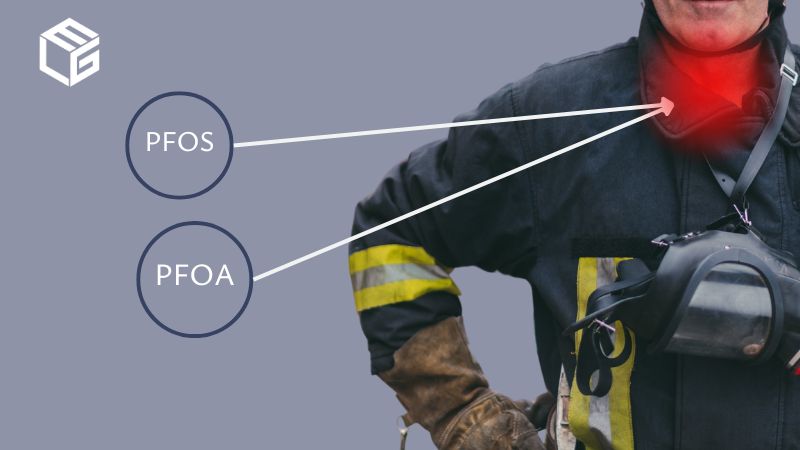Exposure to PFAS from AFFF use can irreversibly disrupt thyroid function in firefighters
Thyroid hormones play a crucial role in metabolism regulation, and thyroid function is related to fertility, cardiovascular disease, and fetal neurodevelopment. Some of the causes of thyroid function disruption are chronic inflammation of the gland, iodine deficiency, having a medical condition that makes you prone to it, such as rheumatoid arthritis, and a family history of thyroid disease. There are four types of thyroid disease that might deem you eligible for compensation:
- hypothyroidism
- hyperthyroidism
- Grave's disease
- Hashimoto's disease
Furthermore, there are certain medical conditions that increase the risk of thyroid disease, including rheumatoid arthritis, nodules, Turner syndrome, lupus, iodine deficiency, and Sjögren’s syndrome. However, recent medical studies found that it can also result from PFAS exposure, and firefighters who use the fire suppressant AFFF regularly are at high risk for thyroid disease.
How PFAS exposure from AFFF causes thyroid disease
According to a recent article from the medical journal Frontiers in Endocrinology, in vitro, epidemiological studies, and ex vivo data suggest that PFAS may disrupt the thyroid hormone system with possible negative effects on pregnancy outcomes and fetal development. Still, data on the thyroid-disrupting impact of these chemicals remain controversial, and so does their impact on human health during various stages of life. PFAS can have multiple detrimental effects on the endocrine function, including the thyroid function, such as:
- they are endocrine disruptors, and any step in the biosynthesis and secretion of thyroid hormones might be affected by PFAS exposure
- the accumulation of PFOA and PFOS was documented in thyroid cells, and a cytotoxic effect was noted following exposure to extremely high concentrations
- PFOS and PFOA inhibit the activity of thyroperoxidase – the enzyme involved in thyroid hormone synthesis, catalyzing the oxidation of iodide – in tumor thyroid cells lines
- short-chain PFAS had no cytotoxic impact on rat thyroid cells and did not interfere with thyroid-stimulating hormone production, yet long-chain PFAS had this impact
Exposure to PFOA, a chemical belonging to the long-chain PFAS category, had been associated with thyroid dysfunctions before the emergence of PFOS, which belongs to the short-chain PFAS category. Still, long-chain PFAS continue to be manufactured by companies that did not agree to ban these hazardous substances, so exposure remains among firefighters because both categories of PFAS are present in AFFF.
Studies conducted before 2017 on the interference of PFAS with thyroid function in humans mostly found a higher occurrence of hypothyroidism due to exposure to PFOA both in the general population and in exposed communities. In 2018, researchers studying the Korean adult general population found a positive correlation between PFAS and abnormal thyroid hormone levels, confirming the results of the previous studies.
Military firefighters, at high risk of thyroid disease due to frequent AFFF use
The formula for the firefighting foam AFFF was invented in 1966 by the U.S. Navy and the 3M company. Since then, military firefighters have been using it, especially on military bases, to extinguish jet fuel and petroleum fires, thereby contaminating the environment and increasing their thyroid disease risk. Across military bases, AFFF would mostly be employed in the:
- firefighting training areas
- military airport hangars
- aircraft crash sites
While the military is planning to replace AFFF with PFAS-free fire suppressants by 2025, the former is still being used today, and civilian firefighters are no exception. Although they might not use AFFF as often as military firefighters, their risk of thyroid disease is still higher than that of the general population. Moreover, another source of PFAS exposure for all firefighters is the very personal protective equipment they wear, which contains PFAS to shield them from extreme heat.
Regardless of whether you are or were a civilian or military firefighter, our attorneys are ready to review your case and determine if you are entitled to financial compensation from the responsible AFFF manufacturers. So, if you suffer from thyroid disease and used this fire suppressant on the job, give our law firm a call, and we will help you.
The diseases and conditions thyroid disease can be misdiagnosed as
Unfortunately, the misdiagnosis rate among toxic exposure victims is considerably higher, so military and civilian firefighters who believe they have thyroid diseases must seek a second and even a third opinion before contacting our legal team. Only the right diagnosis will deem you eligible to file a claim for AFFF exposure. To make sure you have the right diagnosis, it is important to know some of the diseases and health conditions you might be wrongly diagnosed with instead of thyroid disease if this is your true diagnosis, which include:
- heart disease
- sleep disorders
- liver disease
- vitamin deficiencies
- kidney disease
- blood disorders
- depression
- neurologic disorders
If you received one of these diagnoses and were exposed to PFAS from AFFF, you should consult another medical specialist, as you might have been misdiagnosed. Between 40% and 60% of people with thyroid disease are not aware they have it, so this condition can be difficult to miss, even for the most experienced doctors. For this reason, it is crucial to see more than one medical expert, as not only will your diagnosis determine your treatment but also your eligibility to file a claim for AFFF exposure.

